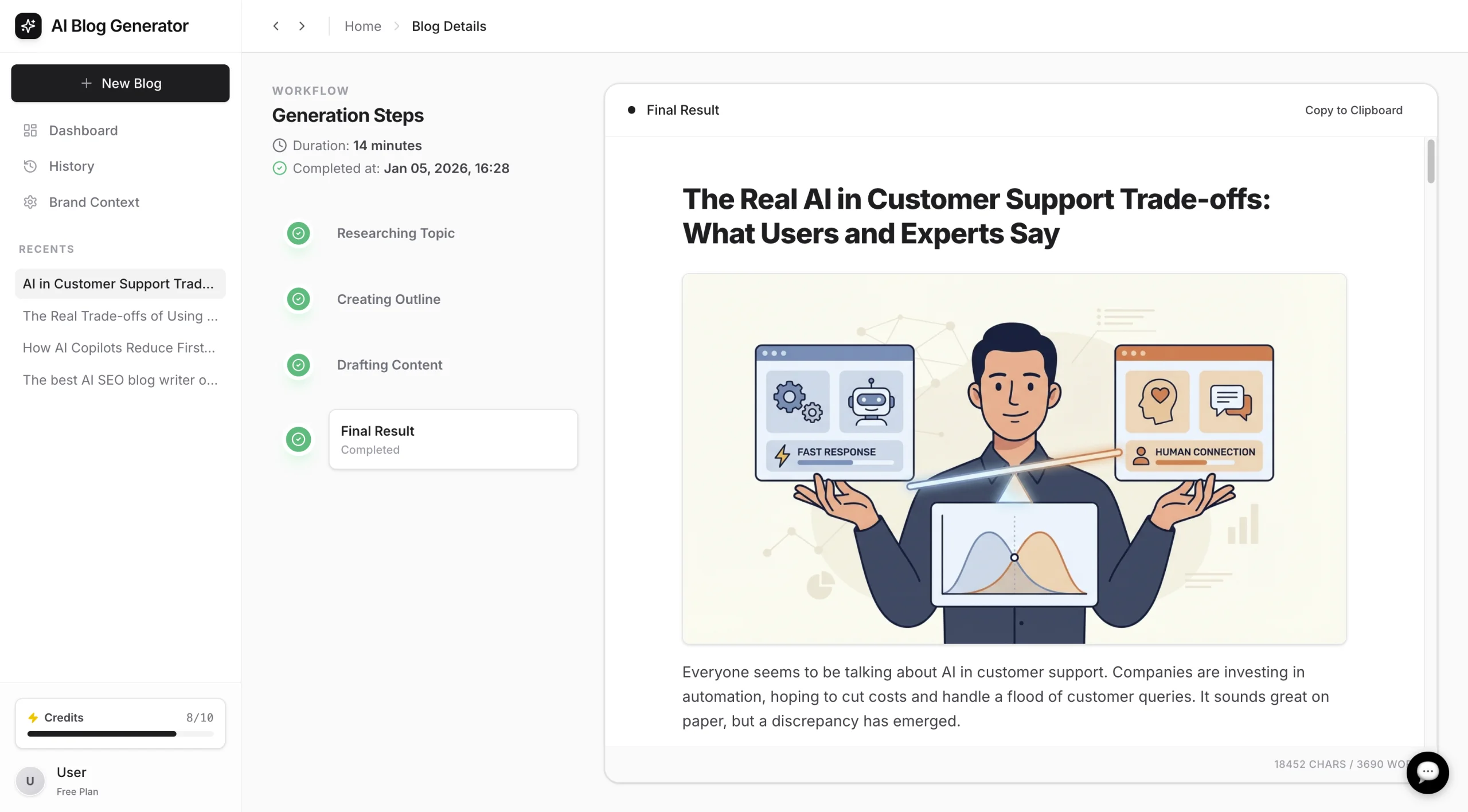Copy AI vs Rytr: Which AI writer is right for you in 2026?

Stevia Putri

Stanley Nicholas
Last edited January 6, 2026
Expert Verified

Trying to pick the right AI writing assistant can feel overwhelming. With a million options popping up, it’s hard to tell which one will actually help you get your work done. Two of the biggest names you'll see are Copy.ai and Rytr, but here’s the thing: built for different jobs. One is an all-in-one platform for large sales and marketing teams, while the other is a straightforward copy generator for individuals.
This article is here to cut through the noise. We're going to compare them directly to help you figure out which tool is the right fit for you, whether you're a freelancer trying to write faster or a team lead trying to automate your entire go-to-market strategy.
An overview of Copy.ai
Copy.ai has changed a lot since it first came out. It’s not just a simple writing tool anymore; it’s a full Go-To-Market (GTM) AI Platform. It’s probably better to think of it as a central hub for your entire revenue team, not just a writing assistant.
It’s really designed for mid-sized to enterprise companies that are tired of juggling a dozen different tools for sales and marketing. Copy.ai’s main goal is to bring everything together under one roof, using AI to streamline everything from finding new leads to coaching your sales team on closing deals.
The platform is built on a few key ideas: Workflows to automate tasks you do over and over, an Infobase that learns everything about your company, and a Brand Voice feature to keep your content consistent. This makes it a great fit for things like building a Prospecting Cockpit to find and qualify leads, automatically handling inbound inquiries, and creating SEO content. It's a comprehensive tool, but it’s built for teams with complex needs.
An overview of Rytr
Rytr, on the other hand, keeps it simple. It's an AI writing assistant that’s all about helping you create good short-form content quickly and affordably. It’s perfect for freelancers, bloggers, and solo marketers who just need to get their daily writing tasks done efficiently.
What most people like about Rytr is its clean, simple interface. You can hop in and start generating copy for emails, social media posts, or product descriptions in just a few minutes. It has over 40 different use cases, so you’ll probably find a template for whatever you’re working on.
It also has a couple of notable features. The MyVoice feature can scan a piece of your writing and create a custom tone that sounds like you, which is handy for keeping your content consistent. It also has a built-in plagiarism checker powered by Copyscape and a browser extension that lets you use Rytr pretty much anywhere you write online.
Copy.ai vs. Rytr: A feature comparison
So, how do they really stack up? This section breaks down the key differences between the two platforms, so you can see where each one shines.
| Feature | Copy.ai | Rytr |
|---|---|---|
| Primary Use Case | Go-To-Market (GTM) AI Platform | Short-form AI copywriter |
| Target Audience | Enterprise Sales & Marketing Teams | Freelancers & Solo Content Creators |
| Key Strength | Automating sales & marketing workflows | Fast, affordable short-form copy |
| Long-Form Content | Yes (Blog Post Wizard tool) | Section-by-section generation |
| Unique Features | Prospecting Cockpit, Deal Coaching | MyVoice, Browser Extension |
| Plagiarism Checker | Not mentioned in documentation | Yes (powered by Copyscape) |
| Pricing Model | Tiered plans based on seats and credits | Simple plans with unlimited words |
| Starting Price | Free plan; paid plans from $29/month | Free plan; paid plans from $9/month |
Content generation and quality
For short-form content like ad copy, social media updates, and emails, both tools do a solid job. Rytr often gets props for generating compelling, human-sounding copy from a simple prompt. Copy.ai is also reliable for these tasks, and its Brand Voice and Infobase features help make sure everything it writes stays on-brand.
The big difference appears when you get to long-form content. Copy.ai has a "Blog Post Wizard" that can generate a full first draft from just a title and a few keywords. Rytr is more hands-on; you have to build your article section by section. This takes more time and can sometimes lead to a piece that doesn't flow as well. Just remember, with either tool, the output is a draft. You’ll still have to do a good amount of editing, fact-checking, and optimizing before it’s ready to go.
Features and integrations
This is where the two platforms go in completely different directions. Rytr’s best features are all made for the individual writer. You get the MyVoice tone matching, a built-in plagiarism checker, and the option to create your own custom use cases. It’s a writer’s toolkit, through and through.
Copy.ai’s power is in its platform-level features built for GTM teams. Workflows let you automate complex processes (like finding info on a new lead from your CRM and then drafting a personalized outreach email). Agents can be set up to handle specific tasks on an ongoing basis. Copy.ai is meant to be the hub of your tech stack, with a powerful API and over 2,000 integrations through Zapier to connect with your CRM, email platform, and other business tools. Rytr, by comparison, mostly works on its own with a browser extension.
Ease of use
Rytr is often highlighted for its ease of use. Its interface is clean, simple, and super intuitive. There’s basically no learning curve, which is great for users who just want to write without getting lost in settings.
Copy.ai, being an enterprise platform, is a different beast. The dashboard is loaded with features, tools, and workflow builders, which can feel a bit much for new users. It’s incredibly powerful, but you’ll need to set aside some time to learn how to make it work for you.
Pricing and value
Your budget is a huge factor here, and this is where Rytr really stands out for individuals and small businesses. Its simple and affordable pricing.
-
Free Plan: Generate up to 10,000 characters per month.
-
Saver Plan: $9/month for 100,000 characters per month.
-
Unlimited Plan: $29/month for unlimited character generation.
Rytr's plans are structured to be accessible, especially the unlimited tier if you create a lot of content.
Copy.ai’s pricing is built around its focus on teams and enterprise needs.
-
Free Plan: 2,000 words in the chat and one user seat.
-
Pro Plan: $49/month ($36/month if billed annually) for 5 user seats and unlimited words.
-
Team Plan: $249/month ($186/month if billed annually) for 20 user seats.
-
Enterprise: Custom pricing for larger teams who need advanced features like AI workflows and extra security.
While Copy.ai does more, it also costs a lot more, especially when you get to the plans that unlock its key automation features.
When to choose Copy.ai vs. Rytr
So, what’s the final call? Here’s a quick breakdown to help you decide.
Choose Rytr if:
-
You're a freelancer, blogger, or solo creator on a tight budget.
-
You mostly need to write short-form content like emails, social media captions, and product descriptions.
-
You want a simple, fast, and clean user experience more than anything else.
-
You'd find tools like a built-in plagiarism checker and custom tone profiles useful.
Choose Copy.ai if:
-
You're on a larger sales or marketing team with a solid budget.
-
You need a platform that can automate things like lead enrichment and sales outreach, not just write copy.
-
Your goal is to get your GTM teams working together on one platform and cut down on other tool subscriptions.
-
You need to integrate deeply with your existing CRM and other marketing software.
For a visual breakdown and live demonstration of how these platforms work, check out this detailed video comparison. It walks through the user interfaces and content generation process for both tools, offering a real-world look at Copy AI vs Rytr.
This video review compares the features, interface, and content output of Copy.ai and Rytr for different use cases.
Alternatives for SEO content creation
For users focused specifically on creating SEO-optimized blog posts, specialized tools may offer a more streamlined process. While both Copy.ai and Rytr can generate text for articles, users are typically responsible for additional tasks like research, adding media, formatting, and final SEO optimization.
An alternative approach is offered by tools like the eesel AI blog writer, which is a specialized tool designed to take you from a single keyword to a fully-formed blog post. Its features include:

-
Publish-ready content: You get a fully structured article with an intro, proper headings, a conclusion, and even an FAQ section.
-
Automatic rich media: It automatically generates relevant images and tables for your post. It also finds and embeds YouTube videos to make your content more engaging.
-
Authentic social proof: To add credibility and a human touch, it finds relevant conversations on Reddit and pulls real quotes directly into the blog.
-
SEO results: The tool was used to publish over 1,000 optimized posts, which contributed to blog growth from 700 to 750,000 daily impressions over three months.
The tool is available to free to try. You can generate your first full blog post and see the difference for yourself without any commitment.
Final thoughts
The choice between Copy.ai and Rytr really comes down to what you need and how big your team is. Rytr is the perfect sidekick for individual writers and small teams who need an affordable, no-fuss tool for short-form copy. Copy.ai is the command center for enterprise teams looking to automate their entire GTM engine.
However, for teams whose primary goal is scaling content marketing for organic traffic, a specialized tool may be more suitable. For that purpose, a specialized solution like the eesel AI blog writer is designed to streamline the process from keyword to published post.
Take a second to think about your goals, and don't be afraid to use the free plans for each tool to see which one feels right for you.
Frequently asked questions
The biggest difference is their target audience. Copy.ai is a big platform for sales and marketing teams to automate workflows, while Rytr is a simple, affordable tool for individual writers who need short-form content fast.
For a solo blogger, Rytr is often the more suitable choice. It's much cheaper, easier to use, and perfect for generating quick drafts for social media, emails, and blog sections.
Copy.ai has a dedicated "Blog Post Wizard" that generates a full first draft, which is more advanced than Rytr's section-by-section approach. However, both tools still require significant editing to get a post ready for publishing. For a publish-ready article, a specialized tool like the eesel AI blog writer can be considered.
Rytr is significantly more affordable, with an unlimited plan at just $29/month. Copy.ai's pricing is geared towards teams, starting at $49/month for 5 users and scaling up, making it a much larger investment.
Rytr is often cited for its ease of use. Its interface is minimalist and intuitive, with almost no learning curve. Copy.ai is a more complex platform with many features, so it takes some time to learn how to use it effectively.
Yes, both have features for this. Copy.ai has a "Brand Voice" feature, and Rytr has "MyVoice," which analyzes your writing to create a custom tone. Both help maintain consistency in your content.
Share this post

Article by
Stevia Putri
Stevia Putri is a marketing generalist at eesel AI, where she helps turn powerful AI tools into stories that resonate. She’s driven by curiosity, clarity, and the human side of technology.





